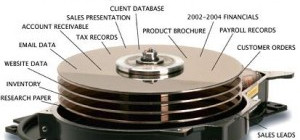 If you have a website, you know how important it is that your site is always an on and available at all times. But there are a lot of things that can affect the performance of your website, even causing it to go offline so that visitors can no longer access your site.
If you have a website, you know how important it is that your site is always an on and available at all times. But there are a lot of things that can affect the performance of your website, even causing it to go offline so that visitors can no longer access your site.
These things include error in codes, incompatible scripts, plugins and themes, database errors, and cyber attacks.
According to recent studies, about 60% of small businesses who were victims of cyber attack ended up going out of business in less than one year. This shows how devastating a cyber attack can be to your website especially when you don’t have a solid backup and restore system in place.
But that is not all, you may think that your business is too small to be a victim of cyber attack, but the chances of your website getting hacked or infected with malware is now higher than ever. In 2017 alone, the number of small businesses attacks grew to 61% from 55% in 2016. So, it is safe to say that no business is safe when it comes to cyber attacks, and steps must be taken to minimise the risks.
But why don’t you backup?
Website problems are not only limited to cyber attacks; even innocent activities on the backend of your website can cause your site to stop functioning. If you install an incompatible upgrade, theme, plugin, or script, it can affect the performance of your site or cause significant downtime. This is especially true of websites built on WordPress where even the smallest mistake can result in a Parse error or White Screen of Death (WSOD).
So, if backing up of your website is obviously this important, why don’t you do it?
In the first place, very few people actually believe that their website can be a victim of a cyber attack. They feel their website is too small to attract the attention of hackers, unfortunately, even if your site does not have information that are of interest to hackers, it can still be used as part of a relay to carry out DDoS attacks, and this will also affect the performance of your site.
Additionally, unlike creating stunning videos or populating a website with beautiful content, backing up is boring by comparison, and not an activity that can be looked forward to. In fact, many people see backup activities the same way they see doing a boring household chore. Little wonder people fail to backup even when there is a backup system for their site in place.
Other times, the complete lack of a backup and restore system is the culprit. If your website has been online for long without any issue, you probably think there is nothing to benefit from having a backup and restore system. After all, you may never have to recover your site from a backup, so what is the point?
Unfortunately, these reasons can turn around to bite later.
When it comes to website security and safety, backup and restore is somewhere at the very top of the checklist, and is something every website should make a priority.
Besides, backing up should neither be boring or glamorous, but it can be either. You can make backup something you remind yourself to do periodically or you can set up an automatic backup service that streamlines backup feature for your website. There are dozens of such tools and services to choose from including Acronis Backup by OpenHost. Whether you choose manual backup or the automatic system, website backup is something that may appear irrelevant at first, but will save you a lot of tears, time, and money in the unfortunate event that something goes wrong with your website, and you need to restore it immediately.
What happens when you fail to backup?
So what’s the worst that could happen in the event something goes wrong with a website and there is no backup and restore feature in place?
The truth is that there are just so many things that can go wrong when you are a victim of cyber attack, or when your website crashes for one reason or another. The effects can either be mild or devastating depending on the range of event, but below are some of the possible results of failure to backup a functional website.
- You could lose all your content
This is one of the consequences of not backing up your website. In the event that something goes wrong, you stand the risk of losing everything you have worked hard to create including text, media, and other forms of content. The biggest consequence of this is the time and money you will spend to redo everything from scratch. If your website is old, you may not be able to remember some of the things you have there, meaning your website will look and feel drastically, and this can discourage your users.
Of course, if you paid someone to build your site and put content on it, the person may have a local backup somewhere, but are you willing to take that chance?
You should also consider the painstaking attention you put to details in your website. Perhaps you made some tweaks to the design, performance, and so on. All of these changes will have been captured in a restore file if you had a backup system in place.
Suffice it to say that without a backup, you are essentially starting your website from the ground up, and this will affect your search rankings and any SEO benefits you may have acquired.
- You will lose all transaction history
If your website is an online store and it gets hit with a cyber attack or something that makes you to lose your website, everything that has to do with past transactions and clients’ personal information will likely be lost. This is not a good situation for any online store, as even when you build back your site; existing customers will not be able to find their accounts or a history of their transactions.
This can open your business up to a lot of issues, including fraudulent customers who will insist that they ordered and made payment just before your site crashed, and who will want you to make a refund or ship the products to them. In fact, you will not be able to differentiate between honest and fraudulent shoppers when they come calling.
You should also think about what could happen if your business were to be audited and there are no transaction records to back your business. This will put you in a very precarious situation with the taxman and other financial regulatory bodies.
It is totally unsafe and irresponsible to run an ecommerce operation without backing up your online store regularly.
- You could lose customers
People who visit websites do so because they are familiar with the site and enjoy their user experience. All of this will change if you have to rebuild your website because you failed to backup and suffered a site failure. And when regular users arrive and find a different site, they may leave never to come back. This may sound a bit extreme, but it is the unfortunate truth. You stand the risk of alienating your regular visitors when you give them a completely different website.
Remember it is cheaper to retain customers than to get new ones, therefore, part of your customer retention strategy should include making sure that your customers have access to the same set of services, tools and content that they are used to, because luring the same set of customers to a strangely different website will not work these days when everyone is conscious of internet security and privacy.
Therefore, if you want to retain the customers you have, ensure that your website has what it takes to quickly go back to the way it was in the event something goes wrong.
What is your backup plan?
Now that you know how really important backing up your website is, you want to consider the backup mode that works best for you.
As already pointed out, you can choose to manually backup your website or opt for an automated backup system where you don’t have to do anything.
Manual backups are relatively easy but have the major disadvantage of forgetfulness and procrastination. You can easily backup the important parts of your website via your website’s control panel or a third party backup plugin, but what if you forget or postpone backing up and then something happens? You will not have a recent backup to restore from and this can cause a few issues.
When you opt for the automated backups, you only need to setup your backup preferences, and the automated system will do the rest. There is no fear of forgetfulness; neither will the automated system postpone backing up for any purpose. This means that you will always have the most recent backup to use, should the need arise.
Whatever choice you settle for, what is important is that you take proactive steps to protect your online investment, so that you have a fall back plan should anything go wrong.







